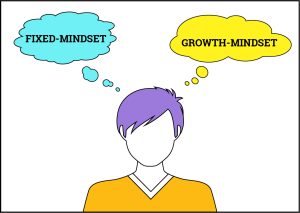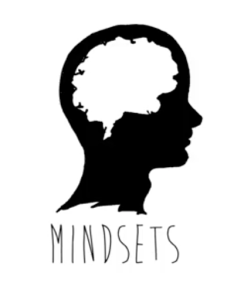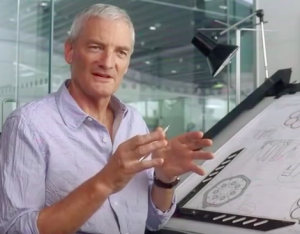What is a mindset?
“Mindsets are beliefs – beliefs about yourself and your most basic qualities and abilities.”1
What is a growth mindset?

According to Carol Dweck from her book Mindset: The New Psychology of Success,“[In a growth mindset,] people believe their most basic abilities and qualities can be developed and cultivated through dedication and hard work. Brains and talent are just the starting point. This view creates a love of learning and a resilience that is essential for great accomplishment. Virtually all great people have had these qualities.”2 Another way to state this would be: Great learners are made, not born.
What is a fixed mindset?
“In a fixed mindset, most people believe their basic qualities, like their intelligence or talent, are simply fixed traits. They spend their time documenting their intelligence or talent instead of developing them. They also believe that talent alone creates success–without effort. They’re wrong.”2

Click here watch a video that illustrates the difference between a fixed and a growth mindset.3

So what do you do if you have a fixed mindset? This video may help!4
Success comes through effort and failure

As you watch this video, consider the ways you can relate this famous failure to your own experiences with effort, failure and success.5
You can watch more inspiring videos about the amount of effort and failure it can take before achieving success or continue on with the module.6
By the end of Activity 4, you will be able to identify a growth versus a fixed mindset.
Set your priorities

As part of the reflect phase of self-regulated learning, it is important to have a clear vision of your priorities.
Complete the following activity to help you achieve this clarity.
REFERENCES
- MindsetWorks. mindsetworks.com
- Dweck, C. S. Mindset: The New Psychology of Success; Gildan Media Corp, 2007.
- Mindsets: Fixed Versus Growth. youtu.be/M1CHPnZfFmU
- The dirty little secret about growth mindset. youtu.be/zionUl13Dko
- James Dyson discusses success through failure. youtube.com/watch?v=_hG79AwLw3s&t=1s
- Failure playlist: goo.gl/rTMQ4e
As stated by Carol Dweck in Mindset: "Mindsets are beliefs – beliefs about yourself and your most basic qualities and abilities.” Identifying your current mindset is essential to guide and take control of your learning. Working towards a growth mindset rather than a fixed mindset means you will be more open and hard-working and will allow you to be more motivated and dedicated to your goals, studies, and work.
The belief that your basic abilities can be developed and cultivated through hard work and dedication. Someone with a growth mindset views their basic skills and talents as a starting point, therefore creating a love of learning and resilience that is essential for great accomplishment. Great learners are made, not born.
The belief that your basic abilities, such as intelligence or talent, are fixed traits that cannot be changed or developed. Someone with a fixed mindset documents their intelligence and skills, rather than actively working to develop and improve them. They also believe that success comes from talent alone, but they are wrong. Success requires effort.
Self-regulated learning can be achieved through the SRL cycle. The SRL cycle allows you to take strategic control of how you approach your goals and be prepared and willing to face any challenges and seize any opportunities that might arise as you work to make your goals your reality. The SRL cycle consists of three phases: reflect, plan, and act. Ideally, you should repeat this cycle multiple times as you create goals and tackle challenges.

